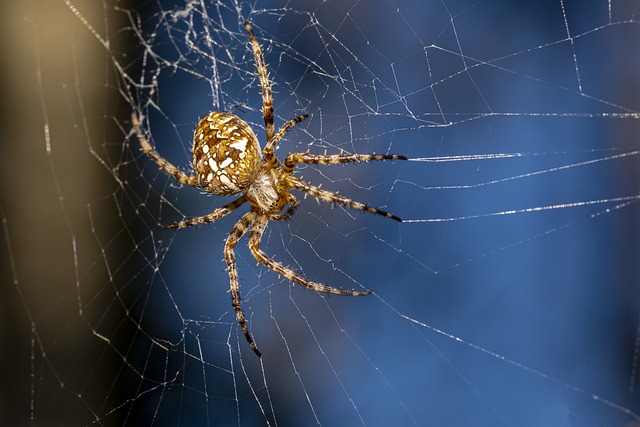Spiders, though often unwelcome indoors, play an ecological role in keeping insect populations under control. To implement humane and eco-friendly spider prevention strategies, understand their habitat preferences and consider methods like sealing entry points, maintaining cleanliness, using natural repellents (e.g., citrus, lavender oils), proper waste management, and reducing water sources. Effective, sustainable solutions include essential oils, herbs, strategic planting, regular cleaning, sealing entry points, and using organic insecticides derived from plants or essential oils to discourage spiders naturally while preserving outdoor ecosystem health.
In today’s world, balancing humane practices with effective pest control is paramount. This article explores eco-friendly and compassionate approaches to spider prevention, providing a comprehensive guide for those seeking to coexist with these often-misunderstood arachnids. We delve into understanding spider behavior and habitat preferences, offering sustainable solutions for both indoor and outdoor spaces. From natural repellents to innovative methods, discover how to protect your home and yard while preserving the environment.
Understanding Spider Behavior and Their Habitat Preferences
Spiders are often unwanted guests in our homes and gardens, but understanding their behavior and habitat preferences is key to implementing humane and eco-friendly spider prevention solutions. These arachnids are incredibly adaptable and play a vital role in maintaining ecological balance by controlling insect populations. They are drawn to specific environments based on food availability, temperature, and shelter—factors that can be manipulated to discourage unwanted spider visitors.
For instance, sealing entry points, maintaining cleanliness, and using natural repellents like citrus or lavender oils can effectively deter spiders without causing them harm. Eco-friendly practices, such as proper waste management and reducing water sources, also make living spaces less appealing to these creatures. By considering their behavior and preferences, we can create environments that discourage spider infestations while promoting a harmonious coexistence with nature.
Eco-Friendly Solutions for Spider Prevention in Your Home
In today’s world, where environmental consciousness is on the rise, it’s possible to effectively prevent spiders in your home without resorting to harsh chemicals or harmful pesticides. Eco-friendly spider prevention solutions offer a safer and more sustainable approach to keeping these arachnids at bay. One of the most effective methods involves maintaining a clean and clutter-free environment. Spiders are attracted to dark, secluded spaces where they can easily hide and build webs. Regularly decluttering your home, especially in areas like garages or attics, makes it less appealing for spiders to take up residence.
Another eco-friendly strategy is using natural repellents that not only deter spiders but also pose no risk to humans or pets. Peppermint oil, for instance, has a strong scent that spiders find unpleasant. You can create your own homemade spider repellent by mixing water and peppermint oil, then spraying it around entry points and areas where spiders are commonly found. Alternatively, planting herbs like lavender, lemongrass, or marigolds in your garden or around the perimeter of your home can also act as a natural barrier against spiders due to their strong scents that deter these insects.
Natural Repellents and Essential Oils to Keep Spiders Away
Spiders can be a nuisance, but reaching for chemical repellents isn’t always the answer—especially if you’re committed to eco-friendly and humane solutions. Thankfully, there are several natural alternatives that can keep spiders at bay without harming them or the environment. Essential oils like peppermint, citronella, lavender, and tea tree oil have been shown to repel spiders due to their strong scents. Mixing a few drops of these essential oils with water in a spray bottle creates an effective, odorless, and non-toxic spider deterrent that can be used around the home.
Planting certain herbs and flowers known for their insect-repelling properties can also help deter spiders from entering your living space. Peppermint, lemongrass, rosemary, and marigolds are just a few examples. Strategically placing potted plants or planting these in gardens and along entryways can serve as a natural barrier against spider invasion. These eco-friendly spider prevention solutions not only keep spiders away but also promote a healthier indoor and outdoor environment.
Preventing Spiders Outdoors: Safe and Sustainable Methods
To prevent spiders outdoors, adopt safe and sustainable methods that avoid harsh chemicals. Eco-friendly spider prevention solutions include regular cleaning of your property, sealing entry points like cracks and gaps in walls or windows, and maintaining a tidy yard by removing potential hiding spots such as clutter or overgrown vegetation. Installing screens on windows and doors can also help keep spiders out while allowing fresh air to circulate.
Additionally, natural repellents like lavender, mint, and citrus oils can be effective deterrents without causing harm to the environment or pets. Planting these herbs around your property’s perimeter can help discourage spiders from invading your space. Using organic insecticides derived from plants or essential oils is another humane option, ensuring that you keep spiders at bay while maintaining a healthier outdoor ecosystem.
In conclusion, humane and eco-conscious approaches to spider prevention involve understanding their behavior and habitat preferences, utilizing natural repellents and essential oils, and implementing safe, sustainable methods outdoors. By adopting these eco-friendly spider prevention solutions, we can coexist with these arachnids while maintaining a pest-free living environment, contributing to both our well-being and the preservation of our planet’s biodiversity.
